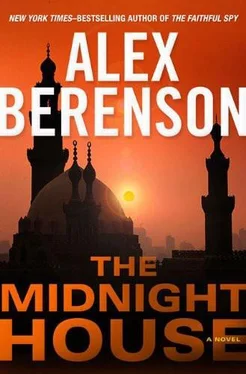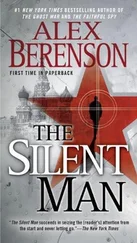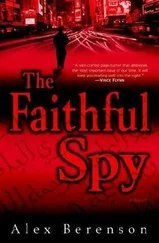Alex Berenson - The Midnight House
Здесь есть возможность читать онлайн «Alex Berenson - The Midnight House» весь текст электронной книги совершенно бесплатно (целиком полную версию без сокращений). В некоторых случаях можно слушать аудио, скачать через торрент в формате fb2 и присутствует краткое содержание. Жанр: Шпионский детектив, на английском языке. Описание произведения, (предисловие) а так же отзывы посетителей доступны на портале библиотеки ЛибКат.
- Название:The Midnight House
- Автор:
- Жанр:
- Год:неизвестен
- ISBN:нет данных
- Рейтинг книги:3 / 5. Голосов: 1
-
Избранное:Добавить в избранное
- Отзывы:
-
Ваша оценка:
- 60
- 1
- 2
- 3
- 4
- 5
The Midnight House: краткое содержание, описание и аннотация
Предлагаем к чтению аннотацию, описание, краткое содержание или предисловие (зависит от того, что написал сам автор книги «The Midnight House»). Если вы не нашли необходимую информацию о книге — напишите в комментариях, мы постараемся отыскать её.
The Midnight House — читать онлайн бесплатно полную книгу (весь текст) целиком
Ниже представлен текст книги, разбитый по страницам. Система сохранения места последней прочитанной страницы, позволяет с удобством читать онлайн бесплатно книгу «The Midnight House», без необходимости каждый раз заново искать на чём Вы остановились. Поставьте закладку, и сможете в любой момент перейти на страницу, на которой закончили чтение.
Интервал:
Закладка:
“Salaam alekeim,” Alaa said.
“Alekeim salaam. You’re Alaa Zumari? I’m Nadeem.”
His camera bag and shoes had materialized at his feet. He pulled out the camera, mounted it on the tripod. He turned on the camera, then turned it off.
“First, you tell me your story without the camera, Alaa. Then we do it again, on tape. It will go more smoothly.”
“I understand,” Alaa said. He was his father’s son, quiet and collected. Wells wondered if his interrogators had misunderstood his composure as arrogance.
“How old are you?”
“Twenty-five. I was born in Alex”—Alexandria. “We moved to Cairo when I was six.”
“Are you very religious?”
“Not so much. He”—Alaa glanced at his father—“always told me to study the Quran, study, study, but I didn’t like it.”
“How did you end up in Baghdad?”
“Four years ago, when I was twenty-one, I was a waiter in the Sofitel.” The Sofitel was one of the bigger Cairo hotels, a tall, cylindrical building on an island in the Nile. “Sometimes I drove a Mercedes for a rich man who visited there with his girlfriends. A very rich man.”
“An Egyptian?”
“Yes. I worked hard. I wanted to save money, to get married. I drove for this man a lot. After a year, his son, at the time he was nineteen, he came to me and said, ‘Alaa. My father likes you. He trusts you. I trust you, too. I want you to go to Baghdad and start a mobile-phone business with me.’ He said, ‘You carry in the phones, and when you get there, you do an agreement with the Iraqicom’ ”—the biggest mobile-phone company in Iraq. “ ‘You buy minutes from them, a lot, millions. They give you a discount. Then you sell the phones with the time attached. If it works, we make a lot of money.’ That’s what he said.”
“But he didn’t want to go to Baghdad himself?”
“He’s not a fool. Unlike me.”
“So you said yes.”
“It’s a risk, okay, but I need the money. I said yes. He gave in fifty thousand U.S. and I gave in five thousand pounds.” Five thousand Egyptian pounds, about one thousand dollars. “All my money. We bought five hundred cell phones, cheap ones, in Qatar. The rest of the money was to buy the minutes.”
“And you went to Baghdad.”
“Yes. Over the border through Jordan. Very dangerous. I didn’t know how dangerous until too late. We drive in a convoy. Six cars, GMCs. Halfway through, the middle of the desert, one of the GMCs, it gets hijacked, the driver shot. The passengers kidnapped. Killed, probably. I don’t know. But we were lucky, we made it to Baghdad. And my rich friend, he has found a place for me to stay, because the hotels are too dangerous. He has a second cousin there. Named Amr.”
Alaa paused, hunched back against the wall, as if reliving his arrival in Baghdad.
“Have you ever been to Iraq?”
“Iraqis don’t like Kuwaitis.”
“Right. So. Baghdad. At first it seems okay. For a few days, I try to get an appointment with Iraqicom. But I can’t. Then one night two men come to the house where I’m staying. Jihadis. Fighting the Americans. They heard about my cell phones. They say, you must pay us a tax.”
“They heard. Who told them?”
“I don’t know.”
“Maybe Amr. Maybe your partner.”
“I don’t know!” For the first time, Alaa raised his voice. “So, they say, a tax. They take a hundred of the phones. And ten thousand of the money.”
“Did you argue with them?”
“No one argues with these men. I think they would have taken it all, but the man I’m staying with, he stops them. And a few days later, they come back, take more phones, more money.”
“You didn’t want them to? You weren’t there to help them? Tell me the truth.”
“I went there to do business! After they come the second time, I call my friend to ask him, maybe I should just come home. He tells me to stay. Tells me, ‘Stay with Amr. Do the deal. Sell the rest of the phones. We can still make money.’ A very good friend.” His voice was low and bitter.
“You couldn’t go home?”
“They told me, don’t try. They said they watch the bus stations, GMCs. They’ll kill me if I try.”
If the story was true, Alaa had been either betrayed by his host or, more likely, set up from the start as an unwitting courier. Wells imagined this quiet man in Baghdad in late 2007, with Iraq teetering close to anarchy. Markets and roads and police stations under attack daily. Wandering into the wrong neighborhood meant certain death. And Alaa, holed up in a house, unable to trust his host, waiting for the insurgents to return, and return again, until the money and the phones were gone and he was left with only his own skin to give them.
Unless, of course, he hadn’t been set up at all. Unless he’d gone to Baghdad to deliver cell phones and money to the jihadis. But if that was his goal, why hadn’t he dropped off his cache and gone back to Cairo to pick up another load?
“What happened next?” Wells said.
Alaa ran a hand through his hair. “What happened? Two days later, the Americans came. Many of them, maybe fifteen. It was the middle of the night. Amr went for his AK, and they shot him.”
“Were there any Iraqis with them?”
“I don’t think so, no. Just Americans.”
By that point all the regular combat operations were joint Iraqi-American, so American-only meant a Special Forces unit.
“They tie me up and put a bag on my head and put me in a helicopter. They say I’m a jihadi, they’re going to throw me out if I don’t tell them the truth. I tell them no, I’m there for the cell phones, I don’t know anything about the jihadis. The jihadis stole my money; they would have killed me if you hadn’t come. But the Americans didn’t believe me. When the helicopter landed, they beat me. This went on for a few days. I told them to look at my passport, my name. But they said they found a computer at the house with messages from Al Qaeda. They said Amr was a big man in the insurgency. To this day I don’t know whether what they were saying was real. Amr never said anything about jihad to me. They told me, just tell us the truth.”
“But you lied.” Wells understood now how Alaa had ended up in 673’s hands.
“I told them about what happened,” Alaa said. “But I didn’t say who sent me.”
“You made up a name.” Wells still wondered why Alaa had been so reticent to give it up, but he decided not to press. The answer would come.
“Yes. This was when I was still in Iraq. They beat me; they kept me in a room like this, no windows, very hot. Finally, I told them a name so they would stop. And they were happy; they stopped beating me. Then a few days later they got angry. They told me they knew I was lying and that I wasted their time. And they said they were going to send me someplace I wouldn’t like. Then the next day they put a hood on me and tied my arms and gave me a shot—”
“With a needle—”
“Yes, with a needle. And I fell asleep, and when I woke up I was on a plane. And then I was somewhere very cold.” Alaa shivered at the memory. “I don’t know where. Since I got out, I tried to figure it out. I think somewhere like Germany. But maybe not.”
“They never said.”
“No. And I couldn’t see anything about it, where they kept me. If I ever left the building, they put a hood on me. But it was Americans who ran it, I’m sure of that. It had a special name. They told me. They were proud of it. They called it ‘The Midnight House.’ ”
“Midnight House.”
“Yes.”
“Do you know why they called it that?”
“They said it was always midnight for the prisoners.”
“Were there a lot of prisoners?”
Читать дальшеИнтервал:
Закладка:
Похожие книги на «The Midnight House»
Представляем Вашему вниманию похожие книги на «The Midnight House» списком для выбора. Мы отобрали схожую по названию и смыслу литературу в надежде предоставить читателям больше вариантов отыскать новые, интересные, ещё непрочитанные произведения.
Обсуждение, отзывы о книге «The Midnight House» и просто собственные мнения читателей. Оставьте ваши комментарии, напишите, что Вы думаете о произведении, его смысле или главных героях. Укажите что конкретно понравилось, а что нет, и почему Вы так считаете.












